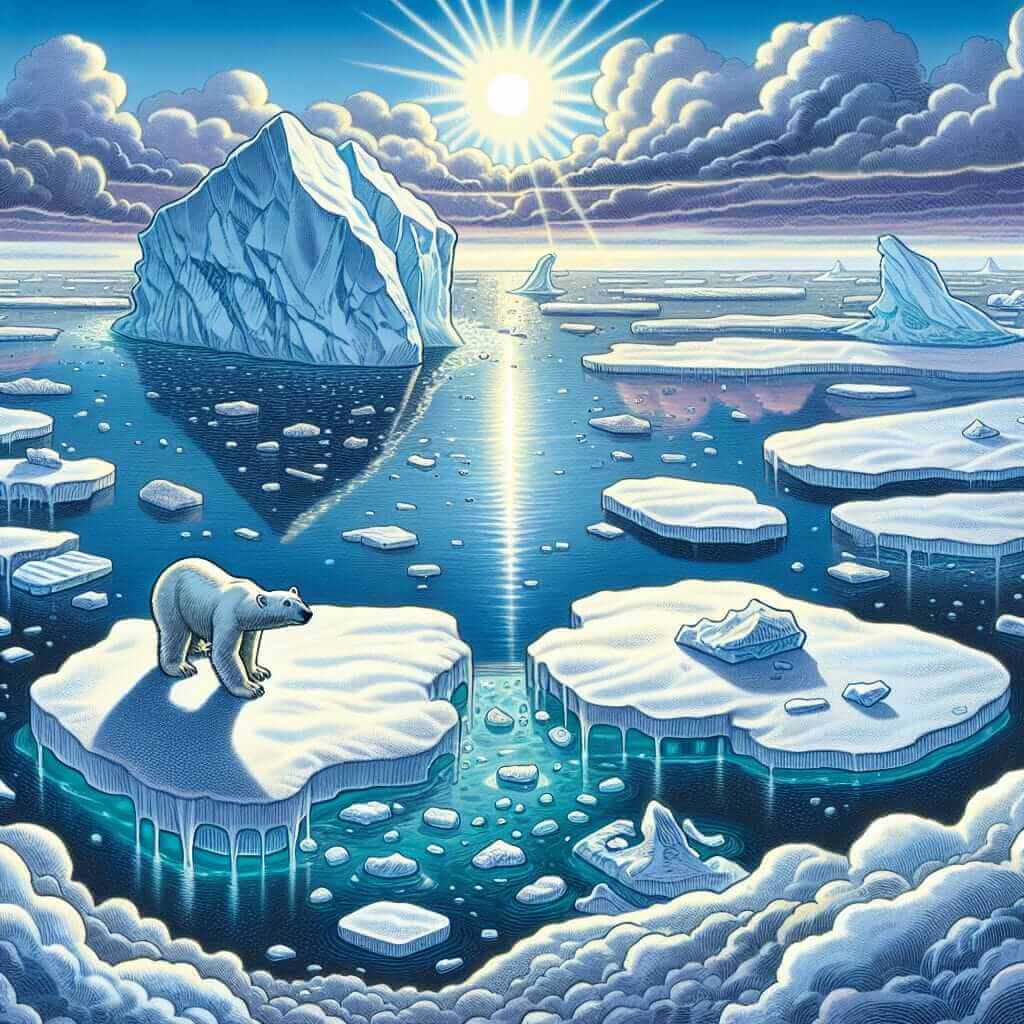The IELTS Reading section tests candidates on their ability to comprehend written English in various formats. The section consists of 40 questions based on 3 texts, and it has been observed that environmental topics, including global warming, are frequently featured. Understanding the complexities and impacts of global warming, especially on polar regions, is crucial for IELTS test-takers. In past exams, texts on environmental and scientific issues have appeared regularly, making this an evergreen topic for IELTS Reading preparation.
Main Content
Reading Passage
The Effects of Global Warming on Polar Regions
Global warming, the gradual increase in Earth’s average temperature, has far-reaching effects, particularly on polar regions. This passage will explore the various impacts of rising temperatures on the Arctic and Antarctic environments, the ecosystems that inhabit them, and the human societies that interact with these regions.
Paragraph A: Melting Ice Caps and Glacial Retreat
The most visible impact of global warming in polar regions is the melting of ice caps and glaciers. In recent decades, ice sheets in Greenland and Antarctica have shown significant reduction in mass. According to the Intergovernmental Panel on Climate Change (IPCC), Greenland has lost an average of 279 billion tons of ice per year, while Antarctica has lost about 148 billion tons since 2002. The reduction in ice mass contributes to rising sea levels, posing a threat to coastal communities worldwide.
Paragraph B: Impact on Flora and Fauna
Polar ecosystems are highly specialized, with flora and fauna adapted to extreme conditions. However, the rapid changes in temperature are disrupting these ecosystems. For example, the polar bear, which relies on sea ice to hunt seals, faces dwindling ice cover and reduced hunting grounds. Similarly, the decline in krill populations due to changing sea temperatures threatens the food web, affecting various marine species, from fish to whales.
Paragraph C: Human Communities
Indigenous communities in the Arctic, such as the Inuit, are witnessing unprecedented changes in their environment, which impact their traditional lifestyles. Melting permafrost damages infrastructure and alters landscapes, while changes in wildlife populations affect local food sources. Furthermore, the opening of previously inaccessible sea routes due to ice melt brings both opportunities and challenges, such as increased shipping activity and potential oil spills.
Paragraph D: Global Feedback Mechanisms
The consequences of melting ice caps extend beyond polar regions, influencing global climate patterns through feedback mechanisms. For instance, the albedo effect, where snow and ice reflect sunlight, diminishes as these surfaces melt, leading to more heat absorption by Earth’s surface. Additionally, the release of methane from thawing permafrost contributes to further global warming, creating a vicious cycle that exacerbates climate change.

Questions
Multiple Choice Questions
-
What has been the average annual ice loss from Greenland according to the IPCC?
A. 148 billion tons
B. 279 billion tons
C. 300 billion tons
D. 148 million tons -
Which species relies on sea ice to hunt seals?
A. Penguin
B. Seal
C. Polar bear
D. Arctic fox
True/False/Not Given
-
The polar bear is threatened only because of hunting prohibitions.
A. True
B. False
C. Not Given -
Increased shipping activity in the Arctic poses no risks to the environment.
A. True
B. False
C. Not Given
Matching Information
Match the following information with the correct paragraph (A-D):
- The reduction of ice reflecting sunlight.
- Environmental impacts on indigenous communities.
- Ice loss from Greenland and Antarctica.
- Disruption of polar ecosystems.
Sentence Completion
Complete the sentences below:
- The IPCC reports that Greenland has lost an average of __ per year since 2002.
- The melting of permafrost releases __, which contributes to further global warming.
Answer Keys
- B
- C
- B
- B
- D
- C
- A
- B
- 279 billion tons
- methane
Lessons Learned
Common mistakes in this type of reading task include misinterpreting data, overlooking keywords, and not understanding the overall context. Here are some lessons to keep in mind:
- Pay close attention to numbers and units of measurement in the text.
- Always read the question stem carefully to ensure you understand what is being asked.
- Look for synonyms or paraphrases of keywords from the questions in the passage.
Vocabulary
Some challenging vocabulary from the passage:
- Intergovernmental Panel on Climate Change (IPCC): /ˌɪntərˌɡʌvənˈmɛntl ˈpænəl ɒn ˈklaɪmət ʧeɪndʒ/ – An international body assessing the science related to climate change.
- Permafrost: /ˈpɜːrməˌfrɔst/ – A thick subsurface layer of soil that remains frozen throughout the year.
- Albedo effect: /ælˈbiːdoʊ iˈfɛkt/ – The fraction of solar energy reflected from the Earth back into space.
Grammar Focus
A grammatical structure worth focusing on is the use of the present perfect tense to highlight actions that occurred at an indefinite time in the past and still have relevance:
- “Greenland has lost an average of 279 billion tons of ice per year.”
- Form: Subject + has/have + past participle
- Example: “She has visited several countries to study the effects of climate change.”
Conclusion
To excel in the IELTS Reading section, especially on topics like global warming and its effects on polar regions, it is essential to practice comprehending complex texts and answering diverse question types. Utilize the lessons and tips provided to enhance your reading skills, ensuring you are well-prepared for the exam.